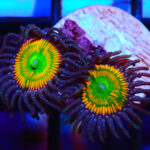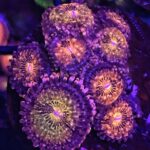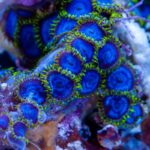- Description
Description
SUNNY D ZOA
Zoanthid corals ( AKA Zoas ) are rather easy to care for and are often recommended as beginner corals.
They gain most of their daily nutritional requirements through the photosynthetic activity of their symbiotic Zooxanthellae, but also absorb nutrients and dissolved organic matter from the water column. They also feed on captured plankton.
Zoanthid polyps do not necessarily need to be fed directly, but will benefit from occasional feedings with finely chopped frozen foods, zooplankton additives or dust food, which will help them to thrive.
Their durability makes them to be rather forgiving to less optimal water parameters and lightning conditions. Zoanthus species may be placed in intensely as well as in moderately lighted areas, they are able to cope with moderate as well as with high and turbulent flows, however, strong currents directly directed towards the colonies may cause the polyps to stay closed.
Under proper lightning and water parameters most Zoanthus species will grow fast- sometimes too well, spreading over rocks and eventually supersede adjacent corals.
Care level
- temperature: 25-27 °C
- food: zooplankton, light (Zooxanthellae)
- flow: low – medium
- light: low – medium (high blue content)
- Level; Easy
Expect 1 – 2 heads per frag.
** Photos is for reference of the species only, actual pcs will vary during shipment .
Water Chemistry: It is important that proper calcium (420-440 ppm), alkalinity (8-9.5 dkh – run it 7-8 if you are carbon dosing) , and magnesium levels (1260-1350 ppm) are maintained. Raising magnesium levels gradually up to 1400-1600 ppm can help to combat algae outbreaks, just keep CA and Alk in line as you raise the Mg.
Nitrates should be below 10 ppm and phosphates should be below .10 ppm. We recommend doing a water change when Nitrate levels rise to 10 ppm. It is important to replace your phosphate media when phosphates rise to .10 ppm. Media Reactors make the most efficient use of your phosphate media by fluidizing it.


















